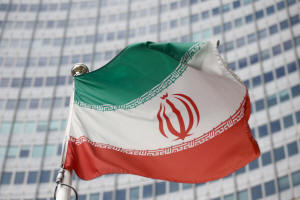Iran and U.S. begin indirect talks to revive nuclear deal
 Send a link to a friend
Send a link to a friend
 [April 06, 2021]
By Francois Murphy, Parisa Hafezi and John Irish [April 06, 2021]
By Francois Murphy, Parisa Hafezi and John Irish
VIENNA (Reuters) - Iran and the United
States will begin indirect talks in Vienna on Tuesday aimed at bringing
both countries back into full compliance with the 2015 nuclear deal that
Washington abandoned three years ago.
Iran has steadily overstepped the accord's limits on its nuclear
programme in response to Washington's withdrawal from the accord in 2018
and its reimposition of sanctions that have crippled the Islamic
Republic's economy.
While Tehran has repeatedly rebuffed "direct and indirect negotiations"
with its old foe, Washington said on Monday it expected the talks to be
difficult. Both Tehran and Washington did not foresee any early
breakthrough.

"We are not optimistic nor pessimistic about the outcome of this meeting
now, but we are confident that we are on the right track, and if
America's will, seriousness and honesty is proven, it could be a good
sign for a better future for this agreement and ultimately its full
implementation," Iranian government spokesman Ali Rabiei told reporters.
U.S. and Iranian officials will begin indirect talks in the Austrian
capital, where the pact was originally reached in 2015, later on
Tuesday. Officials from Britain, France and Germany, are expected to act
as intermediaries. Russia and China, the other parties to the 2015 pact,
will also attend.
A Western diplomat told Reuters on Friday that a shuttle-diplomacy
approach would be adopted. The diplomat said France would be the main
interlocutor for both sides.
According to diplomats, the remaining parties to the deal will first
meet at a Viennese hotel for preparatory talks. The U.S. delegation,
headed by special envoy Rob Malley, will be based in a nearby hotel.
Adding fresh doubt to chances of a breakthrough, an Iranian official
told Reuters: "Our agenda during the meeting will be removal of all U.S.
sanctions against Iran ... as our supreme leader has said repeatedly,
anything less than that will not be accepted by Tehran."
[to top of second column]
|

The Iranian flag waves in front of the International Atomic Energy
Agency (IAEA) headquarters, before the beginning of a board of
governors meeting, amid the coronavirus disease (COVID-19) outbreak
in Vienna, Austria, March 1, 2021. REUTERS/Lisi Niesner/File Photo

Iran's Supreme Leader Ayatollah Ali Khamenei, who has the final say
on all state matters, has opposed any gradual easing of sanctions.
An EU official said working groups would be created with the aim of
marrying lists of sanctions that the United States could lift and
nuclear obligations that Iran should meet.
Diplomats said Tuesday's talks could continue for several days to
resolve some of the easier issues before resuming next week. The aim
is some form of a deal ahead of June's Iranian presidential
election, the official said, although Iranian and U.S. officials
have said there is no rush.
President Joe Biden's administration wants to revive the accord but
has said that this requires negotiations. Tehran has dismissed any
engagement in talks with Washington about both sides resuming
compliance with the deal.

Under the 2015 accord, U.S. and other economic sanctions on Tehran
were removed in return for curbs on Iranís nuclear programme to make
it harder to develop a nuclear weapon - an ambition Tehran denies.
(Writing by Parisa Hafezi and John Irish; Editing by Stephen Coates
and Giles ELgood)
[© 2021 Thomson Reuters. All rights
reserved.] Copyright 2021 Reuters. All rights reserved. This material may not be published,
broadcast, rewritten or redistributed.
Thompson Reuters is solely responsible for this content. |